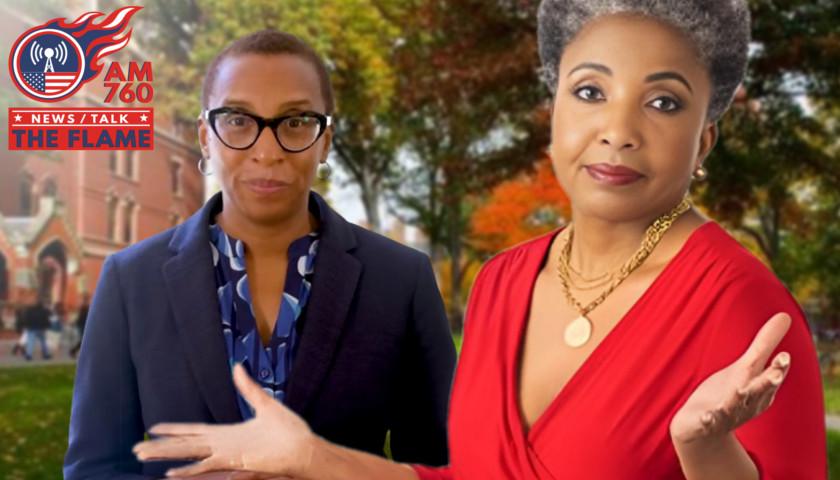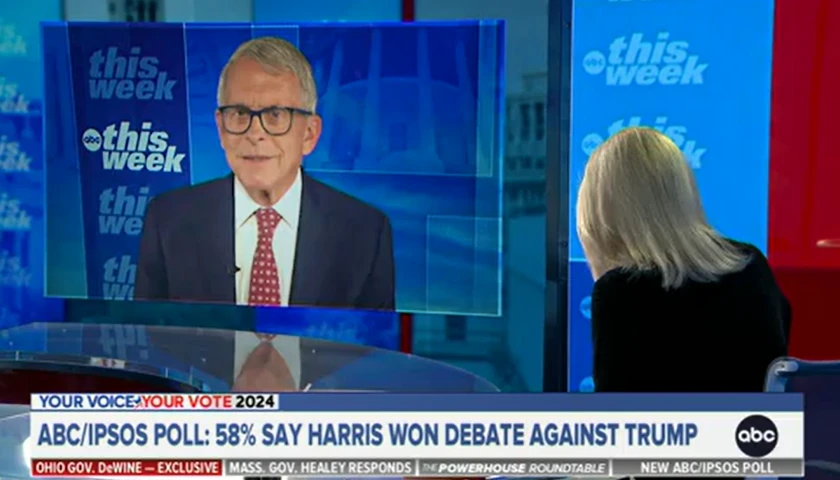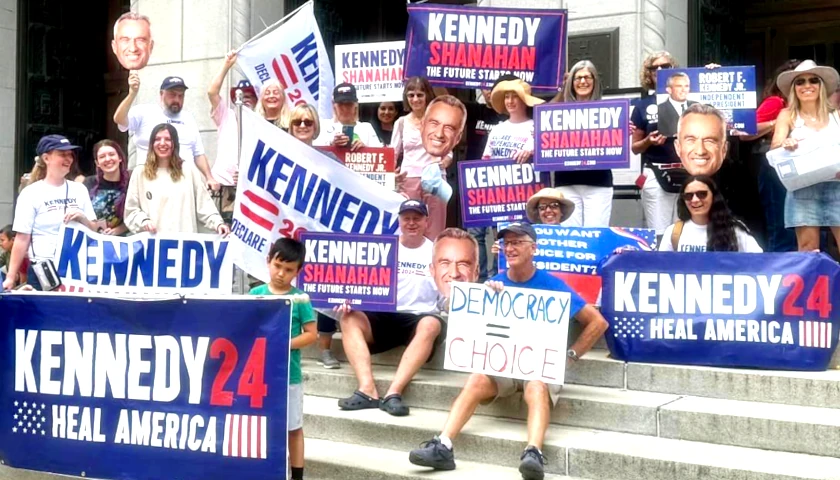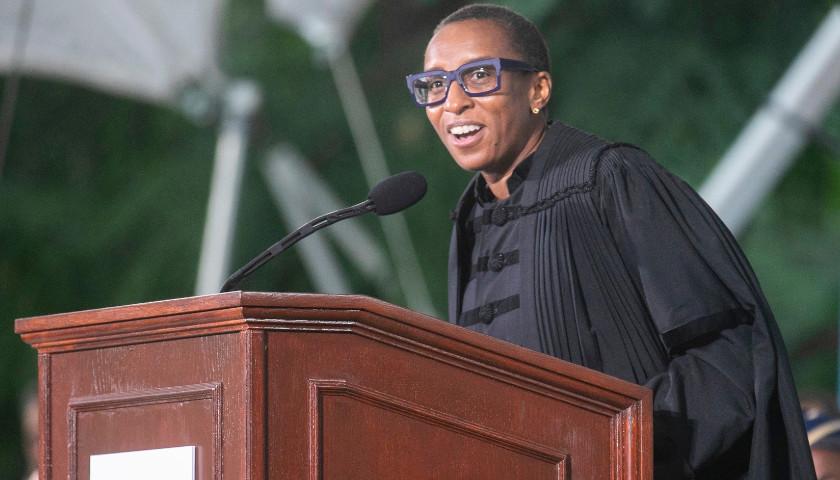In this intriguing installment of the Tennessee Star Report, renowned all-star panelist, Carol Swain engages in an eye-opening discussion about the alleged plagiarism by Harvard’s President, Claudine Gay. Get insight into Swain’s views on academic accountability, the true origin of research ideas, and the integrity of the tenure system. Swain breaks down who she believes is responsible and why; and lays out what she is (and is not!) willing to do to help Harvard find their way out of this growing academic scandal.
TRANSCRIPT
Michael Patrick Leahy: And welcome back to The Tennessee Star Report in studio original all star panelist Crom Carmichael on the newsmaker line right now our very good friend all star panelist Carol Swain. Good morning, Carol.
How are you? Well, you are at the center of a storm here, aren’t you?
Carol Swain: I am. It just seems to follow me around. I don’t ask for this stuff.
Michael Patrick Leahy: So just to set the stage on this. So the president of Harvard, my alma mater, Claudine Gay was under pressure because she refused to condemn antisemitism on campus.
And then Christopher Rufo reported yesterday that Claudine Gay had plagiarized a number of other scholars, including Our own Carol Swain. Take it from there, Carol.
Carol Swain: Well, I have been interviewed twice today about what took place. And I would argue that part of my concern is her research records that followed her dissertation.
Clearly there was a problem with the dissertation because there were passages of people’s works that were not properly quoted and attributed. So that’s one thing; but my beef has to do with the fact that her research topics and the articles that I read that she published, I would argue that it draws closely on my work, that that’s how she got her research ideas.
But when you look at how she cited her work in her literature reviews, you would not know that from reading the work – and I would blame her committee members and reviewers and other people as much as I would blame her because my work was path-breaking.
You know, I won three national prizes. It was cited by many lower courts and also by the U.S. Supreme Court. And so there’s no way that people did not know that I was the one that did the path-breaking work. I would also argue that Her record that earned her tenure would not have earned someone tenure back when I got mine in, in the early 1990s, or the mid 1990s. You had to have a path-breaking work.
It was usually a seminal book, and she doesn’t have that.
Michael Patrick Leahy: She doesn’t have any books, does she?
Carol Swain: I don’t think she does. Some people say that she does, but I looked at her articles and a couple of them are in journals that you would consider major political science journals, but when I actually read the articles, you know, looking for references to my work because they relate to districting, and minority representation, and voting issues that I addressed in my seminal book.
I mentioned my book, 1995, the book was actually published first in 1993 and was reprinted in ’95 and 2006. But it’s along with a string of other people, and then in the one article where she talks about descriptive representation.
My book, one of its contributions was that it identified a trade-off between descriptive and substantive representation, and argues that you can have more black faces and less black representation.
In that article, at the very end, she has a few sentences addressing parts of my work. But in the literature review itself, she doesn’t reference my work, she referenced a couple of people that drew on my work.
Michael Patrick Leahy: So this is like academic dishonesty at a large scale, not just with Claudine Gay, the president of Harvard, but apparently this is a pattern among a number of,shall we say, left wing academics.
Carol Swain: Yes, and I can tell you that I fell out of favor in the 1990s after I got my tenure. I started questioning race-based affirmative action, and I firmly believed that affirmative action should be race neutral and means tested. And that was around the time that Bowen and Bok wrote a book called The Shape of the River.
And the two former heads of Princeton and Harvard came together to write this book to argue that we had to Defend and maintain race-based affirmative action, or you would not have black elites at institutions. You would not have black leaders. And at the time, some people criticized their book because most of the black leaders at that time were coming from historically black colleges.
They were not coming from the Ivy League. But I fell into disfavor. bEcause my work was seen as conservative, but at the time I was a Democrat.
Michael Patrick Leahy: Ah, well Carol now we saw today, we have a story at The Tennessee Star, 500 Harvard faculty members have said, ‘Don’t fire Claudine Gay.’ To me, this undermines their credibility because she obviously is a plagiarist.
Your thoughts on that?
Carol Swain: I don’t know if those 500, faculty members signed that petition when the debate was about her anti semitism or her failure to condemn threats of genocide against Jews. So they may have signed it on the basis of that.
The plagiarism story, as far as I know, it broke last night. That was when my phone started to ring. So I would not read too much into those signatures.
I don’t believe that the Harvard faculty members actually knew about the plagiarism allocations, and of those who may have known, I don’t think that they have thought it through because it’s not just about her forgetting to put quotation marks around a number of passages in her dissertation.
As far as I am concerned, my book, Black Faces, Black Interests: a Representation of African Americans in Congress, published in 1993, reprinted in 1995 and 2006. That’s seminal work. She, her whole career, you know, sort of came out of that, but she did not give me a proper credit.
Just having a bibliographic site without discussing the work or how it impacted you, to me that’s dishonest.
Crom Carmichael: Carol, let me ask you a question. Is plagiarism typically something that is a fairly cut and dried thing. So, for example, I mean, I know there’s – I don’t remember exactly what the term of it is – but if you read a quote and you quote the source when you give the quote, you don’t need to do more than that; or you don’t need, let me put it this way, you don’t need to get permission. So my question is, if you do, how much of her work? And you may not even have a clue, how much of her dissertation is plagiarized and are there more people who she abused than just you?
Carol Swain: Well, I mean, Chris Rufo and another scholar have done that research, and so they’re probably At least two or three others, at least another person where there were whole paragraphs that did not have quotation marks that were just lifted pretty much verbatim, or they were loosely paraphrased, but it would have violated what is considered plagiarism.
But the argument that I’m making that I think is a bigger issue is I feel that she did not generate any original research and then of the research that she did, to the extent that it was solid, and I’m being told that it was not solid, that there were problems with her statistical analyses it did not sufficiently.
Give credit to the source of her ideas of why she was pursuing that research agenda in the first place.
Michael Patrick Leahy: Carol, as you know, I’m a Harvard grad, class of 1977, and I put out a tweet last night, in which I called on President Claudine Gay of Harvard to resign for all these reasons, and I am recommending to the Board of Trustees that they appoint you, Carol Swain, As her successor, President of Harvard.
If nominated, will you run? If elected, will you serve?
Carol Swain: I would not want to be nominated, nor would I run. But I would be happy to use Unity Training Solutions to come in and meet with the board and try to help them come up with a better way. to achieve that diversity goal.
Michael Patrick Leahy: I think that’s a great idea, Carol – and of course, you specialize, your new book is what, The Adversity of Diversity, right?
Carol Swain: Right.
Michael Patrick Leahy: And your training, you set up training for large corporations, large institutions, who are trying to figure out How to deal with issues of diversity and yet be fair and not biased. So you’re offering the board of trustees to come in and do a training session with them at Harvard.
Carol Swain: Well, a training session with them, the board, because at the end of the day, you cannot change the culture of an institution without the leaders buying into it. And whoever’s at the helm, you want the most qualified people at the helm because they’re the ones that’s at the standard for everyone else.
Michael Patrick Leahy: So Carol, if it’s okay with you I will write a letter directly to the Board of Trustees as a graduate of Harvard, and I am going to strongly suggest that they hire you to deliver that training to them as they seek to decide – I mean, they need to get rid of Claudine Gay – after they get rid of her, they’re going to have to pick somebody else and but they have this problem all over Harvard, don’t they, and other Ivy League schools?
Carol Swain: Well, I would be happy to meet with the board of trust and to talk about my research and to share my story and let them know that there’s a better way. And I think that’s what they need is to know that there’s a better way and they need to stop, start thinking outside the box.
Michael Patrick Leahy: Well, I think if somebody’s going to be thinking outside the box, that would be you, Carol.
Crom, you want to say something?
Crom Carmichael: No, I think this is a very, a fascinating issue and, and people who, people who misrepresent in a major way themselves. If you are a Republican, you are out in a hurry. And so it’s going to be interesting to see if the Left believes that. I mean, that’s why I asked how easily is plagiarism identified and at what point is it obvious?
And it sounds like this is a major, major case and it’s obvious.
Carol Swain: Oh yeah, it is. Chris very much documented it and compared it to Harvard’s standards or criteria on plagiarism and so it would fall into the realm of plagiarism. But then you can get into discussion, was it intentional or she just sloppy or how did it happen?
But at the end of the day it did occur and I have no ill will towards her and I blame the system, the system that allowed her to rise and and the people that didn’t hold her accountable.
Michael Patrick Leahy: What’s next on your agenda today? I’m guessing there are a lot of media outlets that want to talk to you about this today.
Carol Swain: There are. I even have a Harvard Crimson. Asking me to interview with him today, and I have another interview in less than 10 minutes.
Michael Patrick Leahy: Well, you know, when I went to Harvard, I was a scholarship kid, but I also had to earn some money. I spent two years getting up early in the morning delivering The Harvard Crimson.
I didn’t write it, but I delivered it. You know, typically, the people who are at The Harvard Crimson are very smart. They’re also very far Left. So my guess is, they’ll be a little bit more than a hostile interview.
Carol Swain: I don’t care. I mean, if I can’t handle a bunch of undergrads – like, really?
Michael Patrick Leahy: ‘Really?’ Now that is very good. And aren’t you going to be on Fox tonight or something like that?
Carol Swain: Tomorrow morning.
Michael Patrick Leahy: Tomorrow morning. Alright.
Carol Swain, our very good friend, all star panelist – thank you for making time in your busy schedule to join us today, Carol.
Carol Swain: Thank you.
– – –
Listen to The Tennessee Star Report with Michael Patrick Leahy weekdays from 11:00 am to 1:00 pm on WENO AM760 The Flame.
Photo “Carol Swain” by Carol Swain; “Harvard President Claudine Gay” and “Harvard University Campus” by Harvard University.






This problem has been undoing the fabric of our society for years. Is this actually a tipping point? Probably not. Academic institutions are full of people with little understanding of simple processes that make up civil society. They have money and power and have no intention of letting it go. They need to be must be taught by the very few that do understand those processes or simply removed.